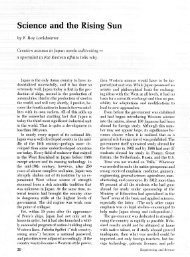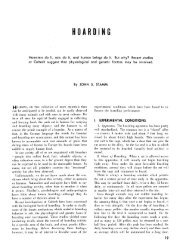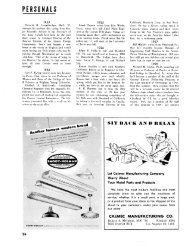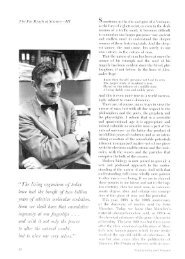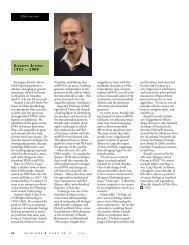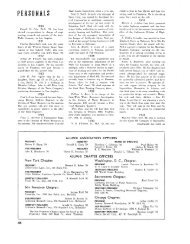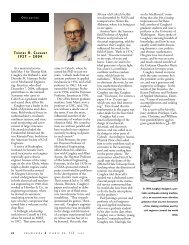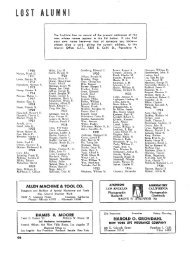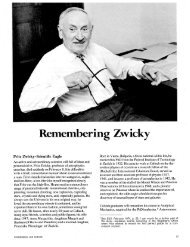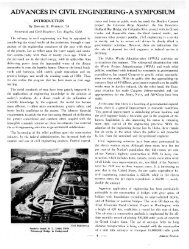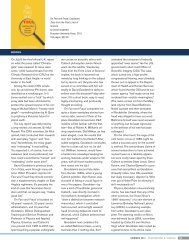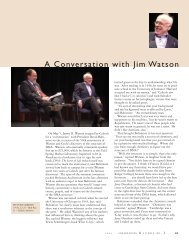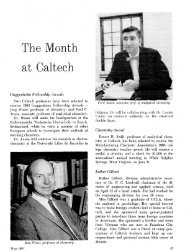published at the california institute of technology - Engineering ...
published at the california institute of technology - Engineering ...
published at the california institute of technology - Engineering ...
Create successful ePaper yourself
Turn your PDF publications into a flip-book with our unique Google optimized e-Paper software.
"Every gre<strong>at</strong> modern university must balance its responsibilities<br />
to <strong>the</strong> worlds <strong>of</strong> reflection and action."<br />
figured out how to do so without moving to Washington.<br />
Caltech has done better than I have financially,<br />
but it wasn't all th<strong>at</strong> affluent when it was my<br />
age, and so I have considerable hope for <strong>the</strong> future.<br />
But let me speak more seriously about this extraordinary<br />
institution for which I really do have <strong>the</strong><br />
deepest respect. For <strong>the</strong> past 20 years I have spent<br />
a considerable portion <strong>of</strong> my time appraising <strong>the</strong><br />
performance and <strong>the</strong> promise <strong>of</strong> institutions-universifies,<br />
schools, labor<strong>at</strong>ories, government agencies,<br />
industrial firms, ~hilanthropic organiz<strong>at</strong>ionsand<br />
those years have taught me to give free rein<br />
to my gr<strong>at</strong>itude and my awe when I have <strong>the</strong> privilege<br />
<strong>of</strong> knowing an institution in its moment <strong>of</strong><br />
gre<strong>at</strong>ness. It isn't an everyday experience, believe<br />
me. I don't want to alarm you by th<strong>at</strong> phrase "moment<br />
<strong>of</strong> gre<strong>at</strong>ness," but, in <strong>the</strong> perspective <strong>of</strong> decades<br />
and centuries, institutional gre<strong>at</strong>ness is a<br />
transitory thing.<br />
The appearance <strong>of</strong> gre<strong>at</strong>ness is more enduring.<br />
Reput<strong>at</strong>ion and tradition are effective cosmetics for<br />
a fading institution. But wh<strong>at</strong> is all too transitory<br />
is th<strong>at</strong> fine moment when an institution is responding<br />
with vigor and relevance to <strong>the</strong> needs <strong>of</strong> its day,<br />
when its morale and vitality are high, and when it<br />
is holding itself to unsparing standards <strong>of</strong> performance.<br />
And when those <strong>at</strong>tributes are not present,<br />
<strong>the</strong>y are not easily supplied. One cannot build a<br />
gre<strong>at</strong> institution as one would put toge<strong>the</strong>r a prefabric<strong>at</strong>ed<br />
house, knowing <strong>the</strong> ingredients and<br />
simply arranging for <strong>the</strong>ir assembly <strong>at</strong> some appropri<strong>at</strong>e<br />
time and place. Nor can one repair a secondr<strong>at</strong>e<br />
or dispirited institution <strong>the</strong> way one might repair<br />
a leaky ro<strong>of</strong>. There's a pleasantly unpredictable<br />
quality about institutional vitality. One can speak<br />
<strong>of</strong> gre<strong>at</strong> leadership, which Caltech has most certainly<br />
had. One can speak <strong>of</strong> <strong>the</strong> brilliant men who<br />
drew o<strong>the</strong>r brilliant men. One can speak <strong>of</strong> loyal<br />
and generous support, which again Caltech has<br />
certainly had. But <strong>the</strong>n one has to yield again to <strong>the</strong><br />
mystery <strong>of</strong> things and to say th<strong>at</strong> <strong>the</strong> growth <strong>of</strong> a<br />
small manual arts school into a world-renowned<br />
nnb ersity in a brief span <strong>of</strong> 75 years is a prodigious<br />
and awe-inspiring occurrence.<br />
One <strong>of</strong> <strong>the</strong> most striking characteristics <strong>of</strong> a university<br />
in its time <strong>of</strong> gre<strong>at</strong>ness is <strong>the</strong> cre<strong>at</strong>ive interplay<br />
between <strong>the</strong> mrld <strong>of</strong> thought and <strong>the</strong> world<br />
<strong>of</strong> action. This is a subject <strong>of</strong> special interest to me<br />
November 1966<br />
because my own career has spanned both worlds.<br />
When I was a young man and tended to devote<br />
my career to teaching and research, particularly<br />
research, I thought my role in society would be a<br />
detached one. I thought <strong>of</strong> myself as an observer<br />
r<strong>at</strong>her than a participant. As I reflect on <strong>the</strong> fact<br />
th<strong>at</strong> my own career, which has led by fits and starts<br />
from almost complete disengagement to almost<br />
total involvement in <strong>the</strong> action and effort <strong>of</strong> society,<br />
I am reminded <strong>of</strong> a barnyard fable :<br />
A pig and a hen were walking down <strong>the</strong> street<br />
one day, and <strong>the</strong>y passed a church with a sign th<strong>at</strong><br />
said Church Bazaar, Your Contribution Needed.<br />
The hen, in a generous, expansive mood, said, "Let's<br />
give <strong>the</strong>m a ham and egg dinner." The pig said,<br />
'Oh no! For you th<strong>at</strong>'s a contribution, but for me<br />
it's total commitment."<br />
I am now in a position to know how he felt.<br />
I want to talk today about <strong>the</strong> ivory tower and<br />
<strong>the</strong> executive desk. I want to talk about <strong>the</strong> whole<br />
range <strong>of</strong> social roles from <strong>the</strong> extreme <strong>of</strong> total de-<br />
tachment to <strong>the</strong> o<strong>the</strong>r extreme <strong>of</strong> complete involve-<br />
ment. At one end <strong>of</strong> <strong>the</strong> spectrum sits Thoreau by<br />
his pond, <strong>the</strong> poet in his garret, <strong>the</strong> scholar in his<br />
study; and <strong>at</strong> <strong>the</strong> o<strong>the</strong>r extreme sits <strong>the</strong> executive<br />
<strong>at</strong> his desk, <strong>the</strong> active citizen in his committee<br />
meeting, <strong>the</strong> leader surrounded by those with<br />
whom he works.<br />
Between <strong>the</strong> two extremes are a thousand way<br />
st<strong>at</strong>ions. Each individual must decide where to<br />
place himself along th<strong>at</strong> range. Each has to decide<br />
how much he wants to become personally involved<br />
in <strong>the</strong> action and effort <strong>of</strong> his society, and <strong>the</strong>re is<br />
no correct answer. The individual must decide in<br />
terms <strong>of</strong> his own temperament and motiv<strong>at</strong>ion.<br />
A society th<strong>at</strong> aspires to cre<strong>at</strong>ivity has urgent<br />
need <strong>of</strong> its detached scholars and critics, as well as<br />
<strong>of</strong> those who will become deeply involved in <strong>the</strong><br />
vi orid <strong>of</strong> action And a university must play a vital<br />
role in producing both.<br />
Until very recently almost all <strong>of</strong> <strong>the</strong> converl-<br />
tional pressures on young people were to get <strong>the</strong>m<br />
totally involved in <strong>the</strong> action <strong>of</strong> society, so perhap<br />
I had better begin by stressing <strong>the</strong> o<strong>the</strong>r side <strong>of</strong> <strong>the</strong><br />
coin-<strong>the</strong> value <strong>of</strong> <strong>the</strong> detached observer. There is<br />
a certain perspective on any social enterprise th<strong>at</strong><br />
can be had only from <strong>the</strong> outside. Th<strong>at</strong> is why<br />
De Tocqueville was able to see our country as no<br />
11



